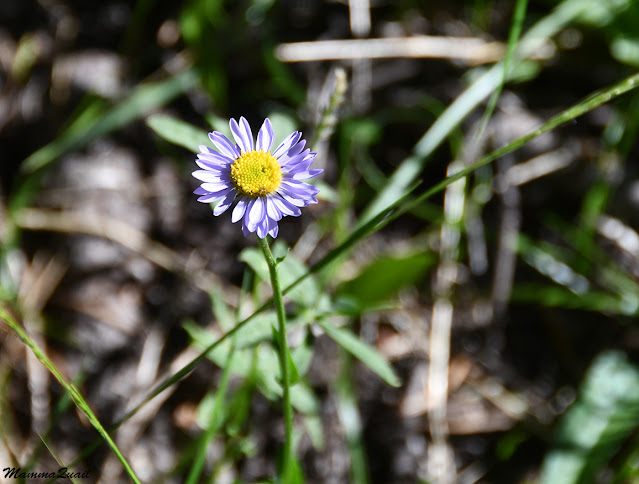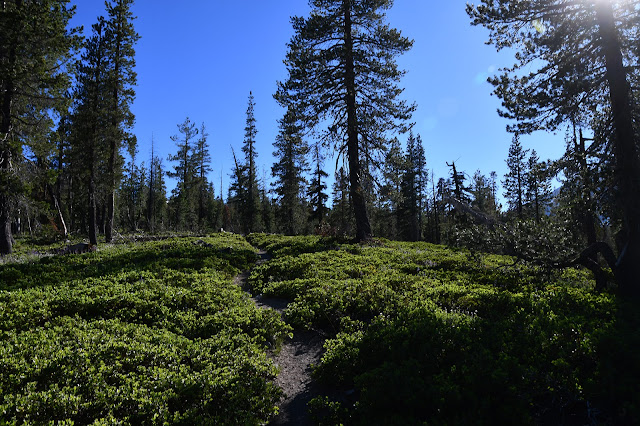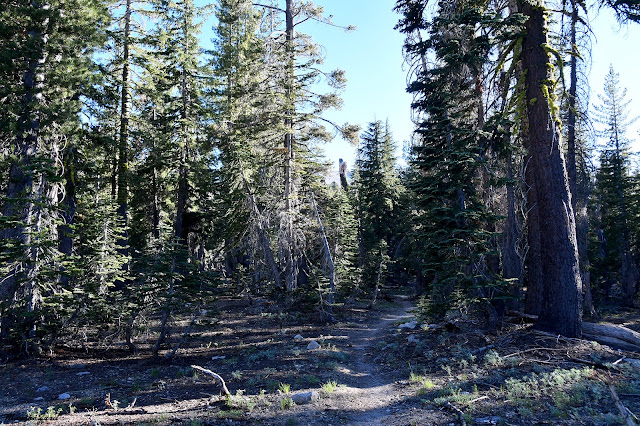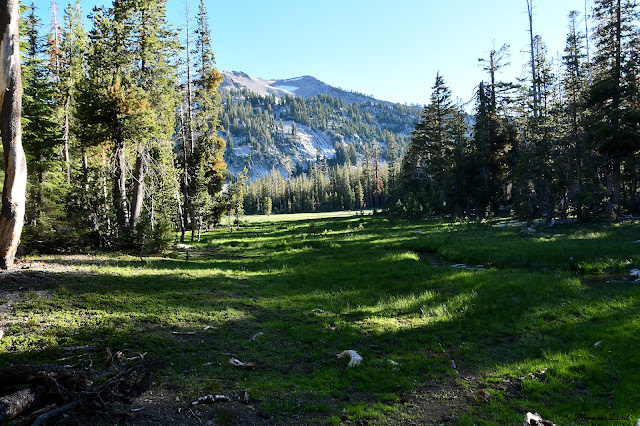 |
| Butte Lake |
Back at the same trail to Cinder Cone. The first half a mile is the same and I didn't bother taking photos, I reached the junction with the sign saying 2.8 miles to the summit. For years I've been passing this sign on my way to Cinder Cone (and yesterday on my way to Snag Lake). Now I took a big breath and turned on the thin trail that led my into an endless pine forest on the way up Prospect Peak.
I already knew from my walk there yesterday that I wasn't likely to see many wildflowers so I didn't have my hopes high, being ready to enjoy what I'd see. I did see small patches of bloom here and there, starting with the expected one, the naked buckwheat.
 |
| Naked Buckwheat, Eriogonum nudum |
The trail started sloping right away. It was when I started going uphill that my legs begun reminding me of the ordeal they went through yesterday. I walked steadily at a slow pace, giving myself time to look around, and pausing whenever I saw something interesting, like this chipmunk.
 |
| Lodgepole Chipmunk |
Prospect Peak is a shield volcano, which has a very gentle slope. On any
hard trail going up would have been a non issue but the trail up
prospect peak is made of fine volcanic cinders, like sand, so it
increases the effort considerably.
 |
Prospect Peak Trail
|
The bottom part of the trail was all the same pine forest with very little undergrowth. I didn't know what to expect at the summit other than views. I thought that the trail would look the same all the way up. At one point though, I was high enough and the trees were sparse enough so I got a view of a nice, smooth dome nearby. That was Cinder Cone, and I was still below its summit level.
 |
| Cinder Cone |
Around that place I started seeing anther wildflower - the wirelettuce. I saw a few of them on my yesterday's hike to Snag Lake, but here were many, many of them. Not a dense carpet, to be sure, but many well spaced individual plants, all of them blooming.
 |
| Large-flowered Wirelettuce, Stephanomeria lactucina |
I kept on tiling uphill. It was getting pretty hot, and I fount myself moving very strategically from tree shadow to tree shadow alng the trail. All that time I was all alone on the trail, so I was startled when all of a sudden a dog came running up the trail from behind me. The dog was followed by a couple of hikers, a vigorous looking man in the front and a tired and sweaty woman lagging behind him. We exchanged greetings and they kept on striding up the slope in a pace much faster than mine. It was well after they were gone from my sight that I remembered that dogs weren't even allowed on that trail.
 |
| Pine forest on Prospect Peak |
A few minutes later I was passed by three more hikers who left me in a cloud of dust as they zoomed past me. All of a sudden I felt very inadequate. Almost subconsciously I picked up my pace, but soon I got winded and went back to my regular slow pace. I told myself that i had nothing to prove to no one, and that I was well within my time limits. Besides, at a slow pace I could see more things, Especially now that the scenery along the trail was beginning to change.
 |
| Volcanic rock piles and ditches |
The forest was greener and denser at the higher altitude. I estimated that I was at the Cinder Cone summit level now, but I couldn't see it through the trees anymore. I did see quite a few mre wildflowers blooming in the undergrowth now.
 |
| White-veined shinleaf, Pyrola picta |
There was considerably more undergrowth below the pine trees. In places there were piles of volcanic rocks. In these places the pine trees were replaced by low manzanita shrubs, and other small bushes. In the rocky areas it was easer to walk too, because the trail was hard and didn't give in under my feet.
 |
| Prospect Peak Trail |
The rocks provided the perfect sunning ledges for the little fence lizards. There were a few of them there, but only one stayed put long enough for me to take its photo.
 |
| Western Fence Lizard |
At the higher third of the mountain the trees seemed healthier and more robust, and the ground had much more vegetation coverage. It's this part of the mountain that retains the winter snow the longest, holding more and longer lasting moisture.
Penstemon plants were much more common here than in the lower part of the mountain. I didn't see carpets of them like I've seen yesterday near Snag lake, but they did grow in small groups, making little blue patches below the pine trees.
 |
| Slender Penstemon, Penstemon gracilentus |
The Mountain Monardella however, did grow in much larger and more continuous mats. The minty fragrance of these plants was strong in the air, especially when I brushed against the plants growing near the trail.
 |
| Mountain Monardella, Monardella odoratissima |
A hiker that I saw early in the morning yesterday when he was coming down the mountain warned me of mosquitoes in the higher elevation of Prospect Peak. I couldn't think of where mosquitoes would be, now that everything was dry. I was happy that I didn't feel any. There were plenty of other insects arund though, of the much friendlier kind.
 |
| Dragonfly |
Bumblebees frequented the wildflowers, loading their legs with pollen, filling the airwaves with their low hum, and completely ignoring me.
 |
| A Bumblebee visiting Mountain Monardella, Monardella odoratissima |
I didn't see active ants on my hike but anthills were plenty. I assumed the ants there are mostly nocturnal.
 |
| Anthill |
Because the mild slope of the shield volcano it's impossible to see the summit from the base of the mountain. The view of Prospect Peak I got from Snag Lake showed me that the very tip of the mountain protrudes up like a butte that was planted on the wide shield form. I remembered to that the very top has much less tree coverage. Indeed, when I reached that altitude the trail became steeper and much more exposed.
 |
| Prospect Peak Trail |
I had good reasons to pause frequently though, because numerous butterflies were moving busily among the monardella blossoms.
 |
| American Lady Butterfly |
The tortoiseshell butterflies love the mountaintops. I've seen them swarm Lassen peak and the summit area of Mount Shasta. Now I saw a few of them (not a swarm, though) near the top of Prospect Peak.
 |
| Milbert's Tortoiseshell Butterfly |
The people who passed my on the way up were now descending down, the dog who wasn't supposed to be there in the lead. They assured my that the views were spectacular, and that there was no one else there. Now I wuld have the mountain all to myself.
 |
| Prospect Peak Trail |
I reached the open area nearing the summit. Above the trees the view opened up. To the southeast I had a nice, clear view of Snag Lake, where I was yesterday. Behind Snag Lake loomed Mount Hoffman.
 |
| Snag Lake |
On my yesterday's hike I thought I saw a snow patch up Mount Hoffman. From the top of Prospect Peak I could verify - Mount Hoffman still had some snow on its upper, north-facing slopes.
 |
| Mount Hoffmann |
The last leg of the ascend curves around the summit butte. Around the curve peeked the very familiar Lassen peak, streaked with snow lines still.
 |
| Lassen Peak |
Below me I started seeing different kind of wildflowers, of plant species that do well in exposed, high altitude places.
 |
| Dwarf Monkeyflower, Diplacus nanus |
I feared the heat when I reached the exposed part of the trail. It was hot, all right, but it was also very breezy, so all and all it was quite nice. There were a few trees, but none cast any shade on the trail.
In place of trees, the slope was covered with low shrubs. Some of the shrubs were blooming too, like the rabbitbrush.
The view from up Prospect Peak was indeed grand, just as the other hikers promised. Lassen Peak loomed with all of its splendor over the low valley between it and Prospect Peak. The one problem with that view was that much of the low area was badly scarred from the fires, both older and more recent. It was sad to see the huge deforestation that happened there.
 |
| Lassen Peak View |
Little blue lakes shone like gems in the fire-scarred area. Many years ago, before the fires, Pappa Quail and I did a hike there. We hiked a beautiful loop in a thick conifer forest, moving from one little blue lake to another. I remembered thinking this area look like the Wood Between the Worlds that is described so well in the Magician's Nephew book of the Chronicles of Narnia. Well, now the wood is no more. The lakes however, looked as inviting as they were.
 |
| Forest lakes |
The trail kept curving around the top of the mountain and the slope eased into almost level. All of a sudden, I was up by the summit, walking along the rim of the volcano's crater. The crater did not resemble at all the gaping hole of Cinder Cone. It was relatively flat and decently forested. I don't know when was this mountain's last eruption but it does look like it has been a long while ago.
 |
| Prospect Peak's Crater |
I found the USGS mark of the summit. I took a quick photo of this mark, which was probably the least interesting thing I saw on this hike. Now it was time to find a place to sit for my lunch break.

The trail continued a little further to the north and it ended on a nice, tree shaded ledge with a grand view of Mount Shasta. Mount Shasta, which
I summited two years before hand, looked like a hovering flying saucer from a different world. I was glad to see that there was still a good amount of snow up there.
 |
| Mount Shasta |
I sat there for a while, enjoying the view. My lunch tasted so much better up on top of the mountain with the tallest volcano in California filling my view! After I finished eating I peeled my eyes off Mount Shasta and checked out my surrounding, where I found more wildflowers.
 |
| Pussypaws, Calyptridium umbellatum |
The tree I sat under was also pretty to look at - very lush and healthy looking. The fires and droughts didn't seen to affect the summit area.
Below the ledge I was on I noticed blooming penstemons of a different species from what I've seen so far on my trip. I made my way carefully down to the flowers to take a closer look. These penstemons where indeed different, of a species that likes the altitude.
 |
| Davidson's Penstemon, Penstemon davidsonii |
I could have stayed on the summit longer, for sure. I did plan on another hike that day so eventually I did gather myself and my things and started back down the trail. I went by a nice patch of slender penstemon, one I didn't previously paid too much attention to. This time I noticed something different and I stopped to take a second look.
Slender Penstemon was the most common penstemon species I've seen on this trip, both on my Snag Lake hike yesterday, and on the prospect Peak hike. It has a beautiful blueish-purple color that is very pleasant to the eye.
 |
| Slender Penstemon, Penstemon gracilentus |
What was unusual that I notices was a white-flowering individual, completely lacking the blue pigments. There was only one such plant there and I wondered if this mutation rendered this plant sterile, or otherwise less prolific. Maybe this was a first generation mutant plant and next summer I'll find more of the white variants if I go up there. Perhaps.
 |
| Slender Penstemon, Penstemon gracilentus, white form |
More butterflies enjoyed the summit bloom, and I enjoyed seeing the butterflies, and whenever they paused a little, to also photograph them.
 |
| Anise Swallowtail Butterfly |
I took my time walking down from the summit. When I started this hike I expected the trail to be all the same - that dry, and very uniform pine forest with very little bloom or wildlife. All that lovely beauty on top of Prospect Peak was a wonderful treat, saved only for those who sweat their way up the slope. I was reluctant to leave it behind me now.
 |
| Buckwheat, Eriogonum sp. |
Going downhill was, as expected, much faster. I did stop to get another look at all the grand views and take more photos of the scenery stars, like Lassen Peak.
 |
| Lassen Peak |
What really blew my mind was the direct view of the summit of Cinder Cone. On my way up I was too strained and too focused on getting to the summit, but now I stopped to appreciate appropriately the magical view before me.
 |
| Cinder Cone |
I increased my lens to maximal zoom and stared directly onto the crater of Cinder Cone. I could see people up the rim trail and the steep slope leading to it. This trip I didn't go up Cinder Cone, but I got to see it from an angle that I never had before. This sight alone was worth the strenuous hike up.
 |
| Cinder Cone |
Once I dropped below the tree line and the views were blocked by the forest I started moving much faster, galloping down the trail, through the trees.
 |
| Prospect Peak Trail |
I like loop trail but I certainly don't mind in and out trails as well. I get to see things from a different angle this way. I also get to see on the way out things I've missed on the way in. Like these beautiful fruiting pinedrops.
 |
| Pine Drops, Pterospora andromedea |
The hawkweed in the rocks I did see on the way up, but the flowers were closed still. On my way down I got to see the inflorescences fully open.
 |
Shaggy Hawkweed, Hieracium horridum
|
Below the rocky area it was once again that dry, uniform pine forest. The breeze that eased the heat of the day up in the summit area was gone, and I was dripping sweat. Whenever I did feel a waft of wind it was like going through a heat wave. Once again I was hopping from one shaded spot to another, but the shadows were much smaller now, that the sun was high in the sky.
Under one of the trees I found a saprophytic plant which I did not recognize. It was just budding out and not yet in full bloom.
I wanted to take a break but there was none. All the fallen logs I could have possibly sat on were either charred or exposed to the blazing sun. I kept trotting downhill, expecting to hit the junction with the Cinder Cone Trail at any moment. I could see the eastern ridge through the trees and I could tell I was pretty far down already.
 |
| Prospect Peak Trail |
Just before the trail junction I saw a hasty caterpillar racing, as fast as a caterpillar can go, across the trail. i felt for the poor critter, trying to get as fast as possible away from open area where it was exposed to the sun and to the predators.
The final leg of the the hike I walked along the Cinder Cone Trail. I was very hot, and exhausted. My plans for the rest of the day included driving to the main part of the park and a short backpacking to my next campsite. I wondered how I was going to hold up to that. I considered taking a short power nap before driving out of the Butte Lake area.
 |
| Cinder Cone Trail |
The solution was much simpler and better. I finished the hike and as I walked slowly toward my car I saw people swimming in Butte Lake. Without any additional thought I dropped my backpack in the car, took my shoes off, grabbed my towel and walked down to the lake. Pausing only briefly to take off my jeans, I went right into the cold water and submerged myself entirely. That short dunk was enough to cool me down and to clear my head. All invigorated, I went back to the car, changed into dry clothes and drove off toward the next part of my solo Lassen Volcanic vacation.








































































